‘They didn’t want us’: Lady Phyll on building 20 years of UK Black Pride despite ‘death threats’ and resistance (EXCLUSIVE)
"25,000 people [all in] one space... No trouble, no drama, just living for the music, living for connection,” the self-described "Black lesbian warrior woman" says of the world’s largest free Pride event for LGBTQ+ people of colour, in this Attitude cover feature
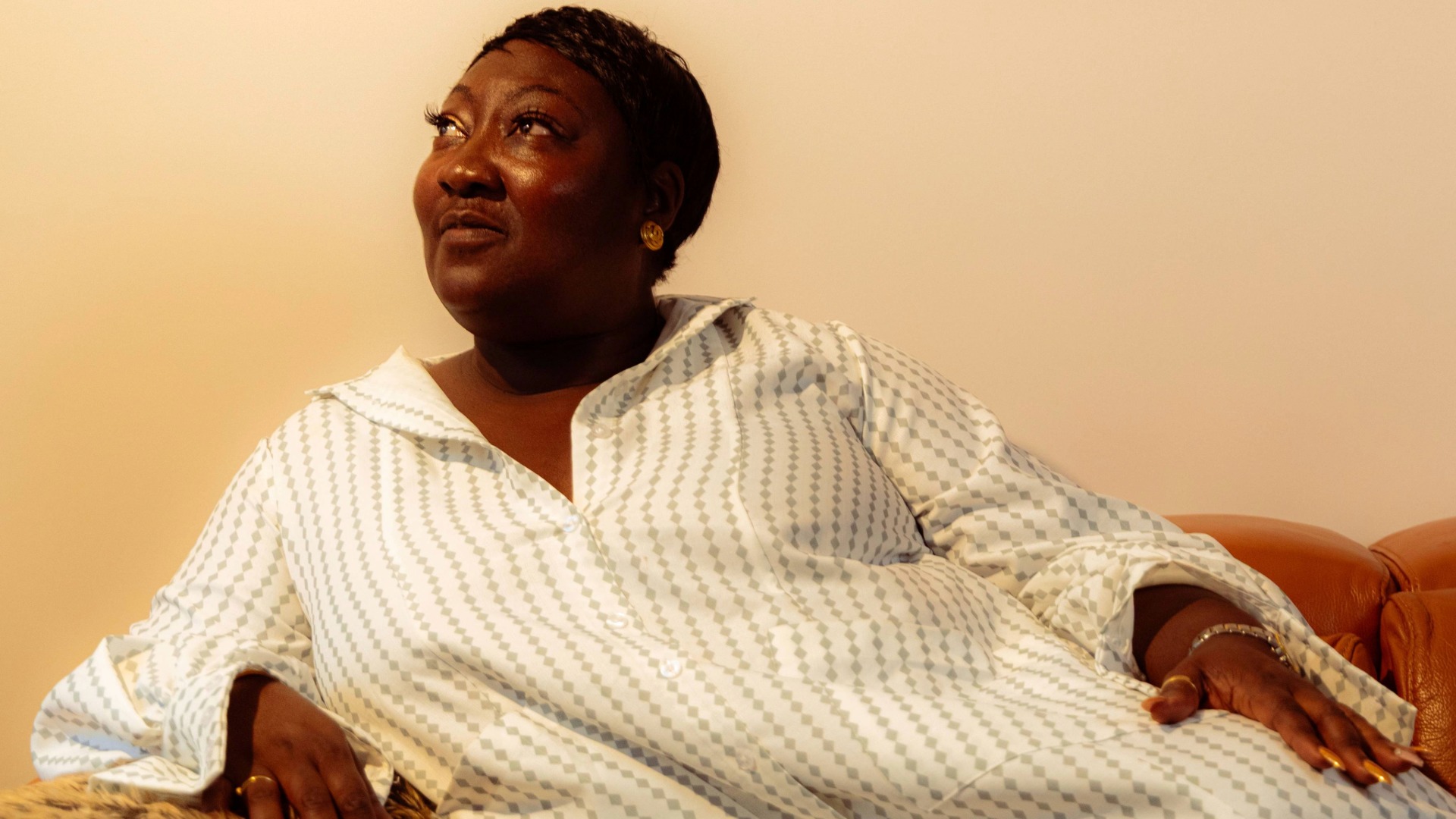
When the idea of starting the UK’s first celebration of queer people of colour was first forming, the pushback from all directions was real. “We were told to ‘f**k off’ and go back to where we came from,” says Phyll Opoku-Gyimah aka Lady Phyll, CEO and co-founder of UK Black Pride, in a statement that hits hard as she reflects on the struggle to establish the now-regular event which celebrates its 20th anniversary on 10 August.
Not only that, but this abhorrent message came from within the LGBTQ+ community, from a well-known LGBTQ+ organisation, says Lady Phyll. “This is 20 years ago,” she reminds me as we sit in her house to conduct her Attitude digital cover interview, “and we have to remember that just because people are from the queer community, that doesn’t make them exempt from being bigots.”
UK Black Pride began in 2005 as an initiative by Black Lesbians in the UK (BLUK), of which Phyll was a member. “BLUK was founded by Bo*, and she brought us all on board to help organise online, and then we took the activities offline,” says Phyll.
“We had this absolutely liberating day …”
Though barrier-breaking, the very first UK Black Pride was a relatively modest affair that saw three coachloads of people take a day trip to Southend. “We had Black lesbian women from Manchester, Durham, Bristol, Wales,” Phyll says of that inspiring first event. “We had this absolutely liberating day of people cooking jerk chicken, rum punch and sitting by the sea. As we were walking back to the coach, we were like, ‘This is the start of a Black Pride.’”
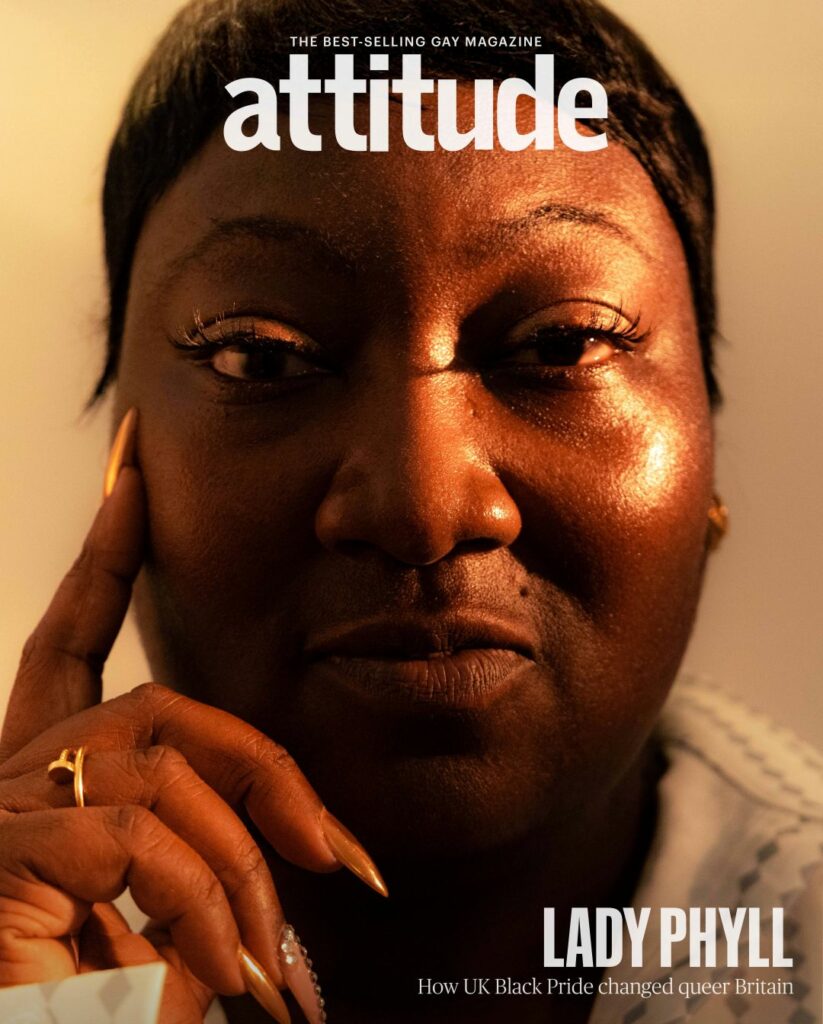
The seed of something new was firmly planted, and there was a great sense of community-building. But nurturing that seed was difficult. “I always say to people, UK Black Pride didn’t just happen so easily,” says Phyll of those early days. “There was so much resistance whenever you used the words Black anything… I guess it was against the backdrop of seeing the BNP, the far right [gaining support]. Yeah, we were called separatists. I received death threats.
“It was really ugly for something that’s supposed to be empowering. People were saying, ‘Why don’t you join the normal Pride?’ And even those who were at the forefront of LGBTQ+ life weren’t making sure that there were spaces for [all] people. They didn’t want us.”
“I don’t believe in empire” – Lady Phyll to DIVA on rejecting an MBE
Phyll describes herself as a “Black lesbian warrior woman”, and “warrior” is an accurate label for someone who has spent much of her life battling for others. In 2016, she was offered an MBE in recognition of her activism and leadership in advancing LGBTQ+ rights, particularly for Black, Asian, minority ethnic and queer communities in the UK – but she famously rejected it.
At the time, she explained her reasoning to DIVA magazine, saying: “I don’t believe in empire. I don’t believe in, and actively resist, colonialism and its toxic and enduring legacy in the Commonwealth, where – among many other injustices – LGBTQI people are still being persecuted, tortured and even killed because of sodomy laws… that were put in place by British imperialists.”
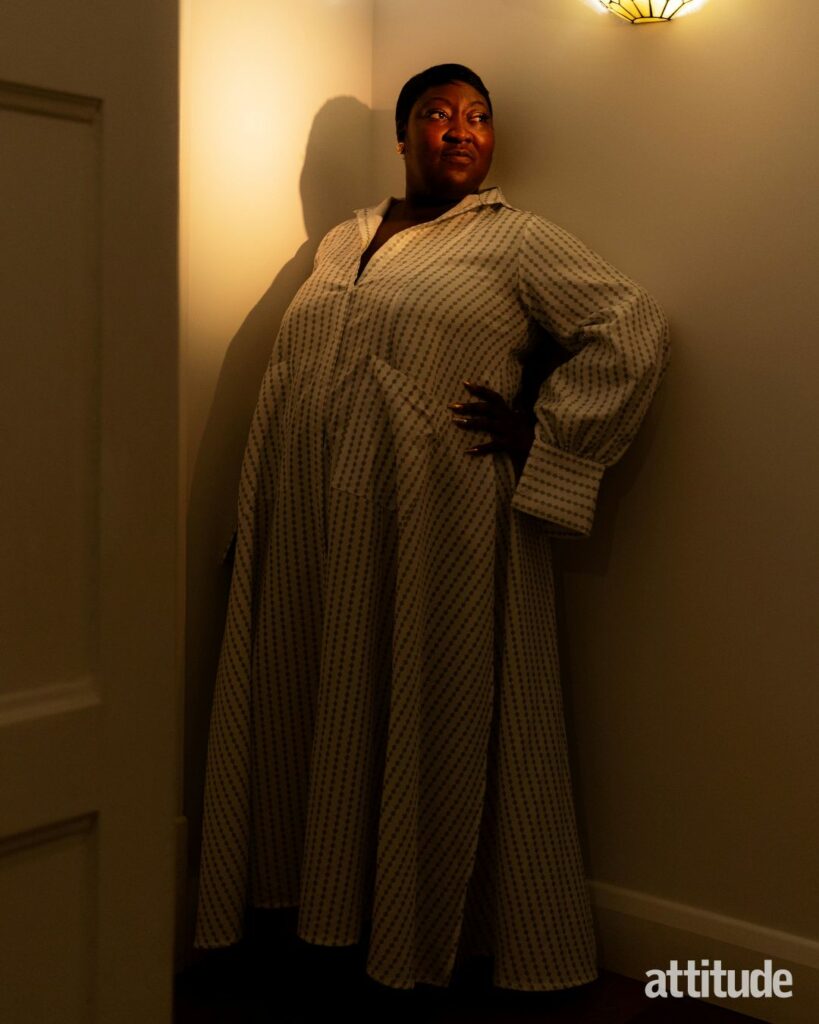
Lady Phyll has devoted her career to fighting inequality. Her previous roles include head of equality at the Public and Commercial Services Union (PCS), where she led on race and equality issues and advocated for fair treatment of Black and minority ethnic workers. She also sat on the TUC (Trade Unions Conference) Race Relations Committee, representing PCS nationally and helping shape anti-racism policy and training across the UK trade union movement.
“I’ve been homeless before, and I know who has shown up”
In 2019, Phyll left PCS and TUC to become executive director of Kaleidoscope Trust, the UK-based international charity working to advance LGBTQ+ rights across the Commonwealth in countries where same-sex relations are banned as outdated laws stemming from British colonial rule remain in place. When Phyll joined, she became the first Black woman to lead a major LGBTQ+ organisation in the UK. Her enthusiasm and drive towards achieving equity and equality for people of colour, queer communities and allies – amid racism, homophobia, biphobia, transphobia, sexism and ableism – is no small mountain to climb.
She’s also had personal struggles. “I’ve been homeless before, and I know who has shown up. As a single parent, I know how hard it is to navigate through life,” says Phyll. And yet, through brilliance and determination, she not only survived, but now thrives alongside her family. Her beautiful home is filled with warmth, kindness, ancestral energy and QPOC-created art. “My daughter is 30 next week. She has a flat on the next floor and won’t move out!” says Phyll.
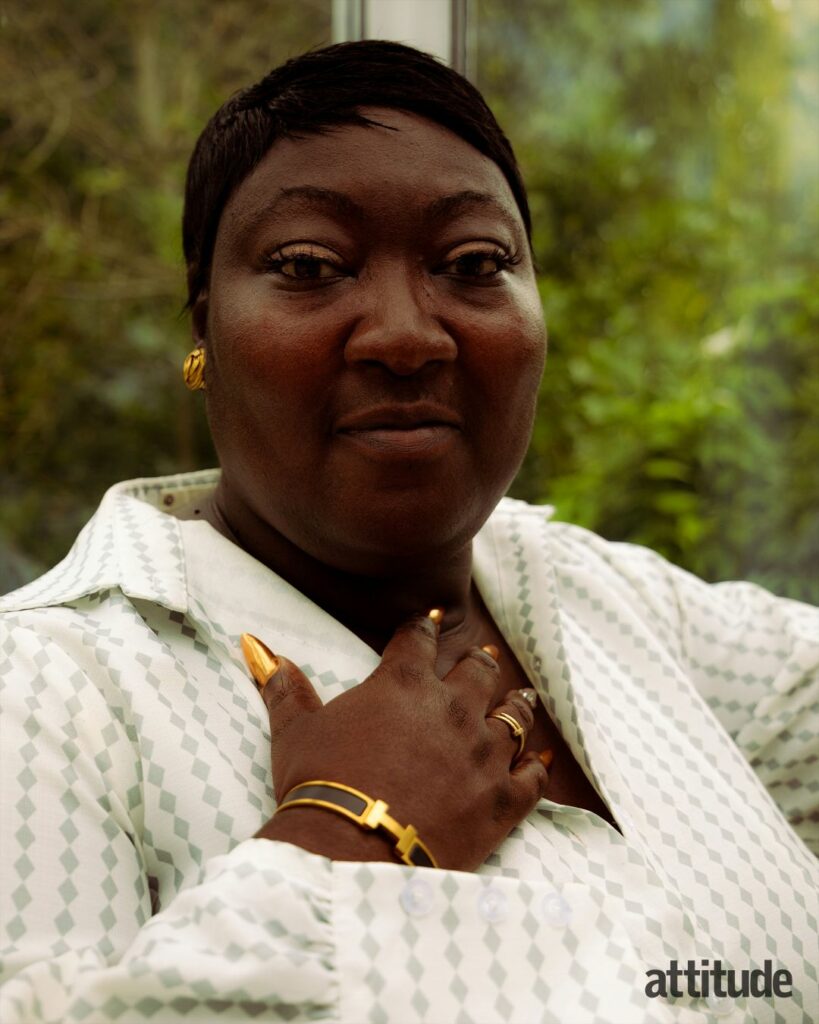
Given her professional background, it’s no surprise that someone with such instinctive fighting spirit was able to overcome opposition and establish UK Black Pride as a regular annual event that broke records in 2022, when 25,000 people attended.
Despite the racism and prejudice UK Black Pride faced early on, nothing would stop the warrior woman on her mission: “We kicked doors down!” she says.
“Gay nightlife wouldn’t touch us, including Heaven and G-A-Y”
Trade unions were some of the earliest supporters. “We had the backing of trade unions from my background,” says Phyll. “I think we were grounded in understanding workers’ rights, why trade unions strike, and why they self-organise – and that’s exactly what UK Black Pride is.” But, she adds, “Corporations wouldn’t touch us. Gay nightlife wouldn’t touch us, including Heaven and G-A-Y. They came on board but not till much later.”
Over the past 20 years, UK Black Pride has grown from a seaside gathering into the world’s largest celebration of LGBTQ+ people of African, Asian, Caribbean, Latin American, Middle Eastern heritage and beyond with powerful themes like ‘Power’, ‘Legacy’ and ‘Freedom & Justice’. Performers have included Emeli Sandé, Beverley Knight, Janet Kay and Sutara Gayle (aka Lorna Gee), bringing music, dance and spoken word to the main stage. It is an event that consistently centres QPOC joy, safety and resistance.
A personal highlight of Lady Phyll’s is the army of volunteers that help stage the annual event. “When you start to see people from our community interested and give their time freely – I never, ever take that for granted,” she says. “Every day, I thank my team because without them, I couldn’t do what I do.” And, of course, having, “25,000 people [all in] one space and us all feel like we’re at home breaking bread. No trouble, no drama, just living for the music, living for connection.”
Shining example
Its reach extends beyond an annual event. In 2024, UK Black Pride launched the Community Action Fund, which donates to organisations that support LGBTQ+ Black people and people of colour in the UK. It has also held institutions accountable. Following the 2019 UK Black Pride, it uninvited the Home Office from holding a stall at further events after data revealed that 78 per cent of asylum applications made on grounds of sexual orientation were rejected by the Home Office in 2017–18.
It has also supported trans visibility through campaigns like 2023’s 16th Century Life Expectancy, addressing the myth of a 35-year life expectancy for Black trans people. On supporting our trans family, Phyll says the organisation has worked both publicly and behind the scenes, “lobbying MPs, signing petitions, protesting, donating what you can – wigs, clothes.”
Above all, Lady Phyll is a shining example of representation at its most powerful.
“You are influencing others to inspire themselves”
Born in Islington to Ghanaian parents, Phyll recalls a story that still moves her today: “This must have been back in 2019, and she was from Ghana. She sent me the most beautiful email saying, ‘One day, I’m going to get out of Ghana. I’m going to get my visa, and I’m going to come because I want you to know I’m so proud to see another Ghanaian woman making headways, speaking about being a lesbian and doing it unapologetically. That one day, I’m going to say that to my family and live my life, stop hiding behind the mask.’
“So, of course I’m reading this, blubbering away. That meant so much to me… Visibility is so important and representation, if it’s positive. You are influencing others to inspire themselves,” says Phyll. “When I started UK Black Pride, there were people that were doing this work before me. They may not have been called UK Black Pride, but we had Femi Otitoju, we had Veronica Mackenzie, Blessence and Lorna Gee [now Sutara Gayle].” All these legends worked towards improving QPOC rights and visibility, inspiring Phyll to become the person she is today.
Adds Phyll of the tight-knit community that helped pave the way for UK Black Pride: “I would add the word ‘chosen’ before family, because not everyone has bloodline family that can support them… chosen family means love.”
“When you are empowered … you can do better”
Education remains at the forefront of all that Lady Phyll does with UK Black Pride. Her father’s words still echo today: “He said, ‘You can have all the materialistic things you want, but study because nobody can ever take that degree away from you.’
“We have workshops, whether it’s schools, someone talking about financial services and how to be better with your money, or an individual talking about their Black queer skating company,” enthuses Phyll. “When you are empowered and you feel like you know something, you can do better. You can go and organise.”
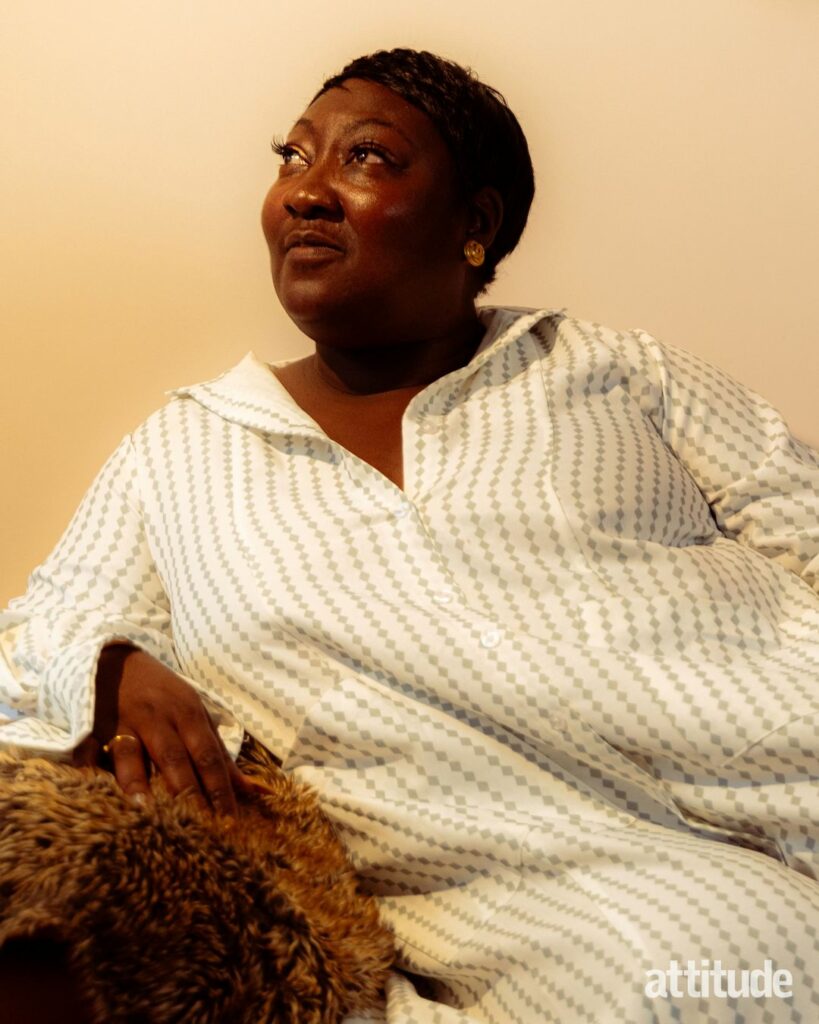
Intersectionality is also central to Lady Phyll and UK Black Pride’s work. Phyll explains the importance of devices like the interfaith space. “So many of us have come from families where they’re Christian, Muslim, Sikh, Hindu, Catholic, and we don’t often get to reconcile our faith with our sexual orientations,” she says. “They don’t have to leave [their chosen faith] because they can reconcile this. [Rev.] Jide Macaulay from House of Rainbow does some brilliant work on bringing those pieces together.” That intersectionality reflects the diversity within the UK Black Pride team. “I think what’s changed is the people as well. We’ve got this wonderful East Asian woman on our team, and that’s the first time ever we’ve had intersex people on our team.”
On her hopes for the future, Phyll simply says that she hopes younger generations “don’t have to suffer or struggle like the generation before them did”.
As UK Black Pride marks its 20th anniversary, it’s clear that the movement, under Phyll’s inspirational leadership, has become more than a festival of celebration. It’s a beacon. A safe haven. A call to action. And a classroom. It proves what happens when queer communities come together, not only to survive but to celebrate, organise and thrive.
*Surnames have been withheld to protect identities.
